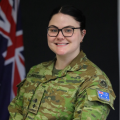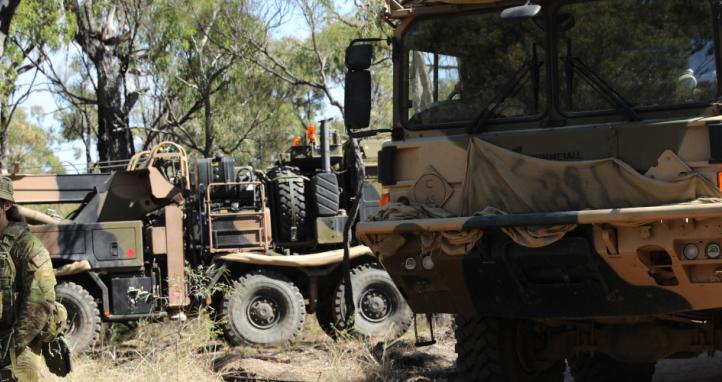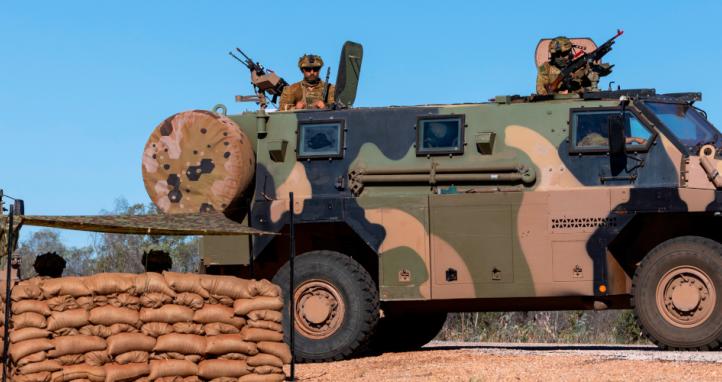An AusPost box of hand me downs, that is where this conversation started.
I looked at a box full of the last nine months of my little boy’s life, to be sent to another Army mum across the country, pondering how my life had changed. My life had suddenly become so much bigger in an instant. The responsibilities I had have now increased tenfold; the stress from my new role as a mum and my role as an Army Officer colliding in some sort of coming-of-age story.
The concept of ‘it takes a village’ and how that translates to being an Army Mum is unique. Your village is more often than not a mismatch of face time calls, midnight texts, Skype calls from work, and sending emails. Those women are there, providing you the backbone to be able to face your biggest battle yet: how to be a mum and a servicewoman at the same time. But shouldn’t your workplace be a part of that village providing support? That workplace you’ve given up so much to serve?
The concept of a village is a tricky one, as most modern-day mums don’t have it. We no longer live in local areas and have generations to lean back on to help raise our children. These days, with 73.7% of couple families with children under 15 having a working mother (Australian Bureau of Statistics 2020-21). Mothers need to be able to balance it all. They may have a supportive partner; however, the vast majority of the mental load falls to the mother in most modern-day families (Dean, Liz & Churchill Brendan & Ruppanner, Leah 2021).
Defence mothers are no different. Arguably this is even harder for them to manage. The unique job requirements of being a mother and being in the ADF are like no other. The organisation required to be able to balance all the competing priorities and such things as out of location work like field and required courses, let alone the planning that would be required for a potential deployment. Prior to their child’s birth, ADF mums need to navigate a specific health care system and complicated job requirements that often their civilian counterparts would have never considered. These are all things Defence mothers carry in their mental load, in addition to the in-barracks requirements of their job role or trade.
Being a mum no longer excludes women from joining the ADF, and the policies surrounding motherhood are becoming more inclusive; however, there are improvements needed to ensure mothers in the Defence Force are supported and empowered. There is a way to go in making the balance of Service and motherhood more manageable, more sustainable, and more realistic for the modern-day Defence mother.
Cognisance of the impact that motherhood has on service is important, and the implementation of organisational policy that can make this massive shift in a woman’s life more manageable will have notable positive impacts on recruitment and retention within the workforce.
The best information comes right from the source: hearing what these mothers have to say.
To understand this experience better, a small exploratory research survey was conducted. The method utilised was an open-ended questionnaire of exploratory questions related specifically to motherhood in Defence and the individual’s experiences. The mothers involved opted in, utilising word of mouth to advertise the research. The questions were sent out via email, then de-identified. The responses were collected over five months. Fifty mothers across Army – ranging in corps, rank, SERCAT, time in service, and age of their children – responded to the questionnaire. Limitations of nil RAAF or RAN mothers, and lack of wider dissemination were identified.
Six questions were asked of these mothers, and whilst experiences may vary some common themes became abundantly clear.
What are some of the challenges you’ve faced with being a mum in Defence?
66% of the mothers reported a lack of support due to moving away from family, friends, and established community. 88% of responses discussed a lack of understanding from their chain of command, in both what they can and can’t do but also what new skills or experiences they can now bring to the table. Feelings of inadequacy, judgement, and stress were reported in 96% of responses.
Has becoming a mum changed how you feel about Service? If so, how?
The responses to this question were largely positive, with 84% of participants reporting their desire to serve increasing after having children. The vast majority, 82%, of mothers surveyed described an increase in compassion and a shift in how they approach management, focusing more on the welfare of members and their individual strengths. 100% of the mothers surveyed noted that their feelings regarding service changed regarding being away from home, and 76% of the mothers noted stress and anxiety about what that means for their future employment in Defence. 50% of the survey responses noted they considered a SERCAT change to better balance motherhood and fulltime service, largely when children are under school age. 94% of mothers surveyed noted location became a key indicator of future service, and being closer to family support had a direct effect on their future ability to serve.
Have your career aspirations changed since becoming a mother?
76% mothers noted their career aspirations changed, but that they had more drive, more passion, and more buy in to this organisation. However, 86% of the survey responses noted that there was a drastic shift of interest in their careers – moving away from deployment and ‘on the tools’ and more toward personnel management and welfare.
What skills has motherhood brought you that have positively affected your ability to serve?
90% of survey responses circled largely around a better level of understanding. Particularly noted within the lower rank groups, all the survey responses below SGT noted that before their own pregnancy and childbirth they had no idea of the policies Army has regarding pregnancy and motherhood. All the mothers responded with the desire to help, mentor, and assist other service women going through this experience. Some other common responses included improved time management skills, an understanding of younger generations and how that can relate into future Defence decision making, and an overall improved understanding of the complexities of family life that may affect their future members.
How has the organisation supported you through your pregnancy and post-partum period?
All SERCAT 7 surveyed mothers noted financial support and access to healthcare as a positive, all also noted that the ability to be classified non-deployable assisted them in preparing for their new family life by sheer fact of being at home consistently. Thirty mothers of the fifty noted issues with understanding the system, finding the policies, understanding the policy language, and a lack of understanding of policy within their chain of command. Notably four responses from CPL and below noted due to their trades, and irregular computer use, they do not often access policy on the DPN.
What areas would you like to see changed or reviewed to support retention of mothers?
Predominately the responses to this question were in regards to childcare/schooling. Another common topic was support required to first time mothers in finding and understanding policy. 70% of mothers in the group raised the unique Defence issue of being moved away from family support numerous times and therefore being extremely reliant on childcare. Posting and the limited timeframe to organise childcare in a gaining location was mentioned by all but three of the mothers surveyed; making mention that Defence do not provide much, if any, additional support to getting children on already long waitlists in posting locations. First-time mothers in Defence faced an uphill battle in finding and interpreting policy; especially noted by the lower ranks within the cohort. Feeling ill-informed to be able to advocate for choices, healthcare needs, and administrative management in regards to pregnancy and return to work post MATL were all noted in responses.
Why does this even matter?
A focus on retention of women, and therefore mothers, within Defence is of vast importance moving forward. By having working mothers in the organisation, Defence encourages diversity, equality, and more gender parity. In accordance with the Defence Strategic Review, ‘the ADF workforce requires an innovative and bold approach to recruitment and retention’ and by nature of the changing strategic needs of the ADF more areas and trades are being filled by women than ever before. Seeing this as an asset, offering a specific and unique perspective, the ADF can benefit greatly from both the recruitment and retention of women and – as a natural byproduct – service mothers.
Women make up almost half the paid workforce in Australia. 73.7% of couple families with children under 15 have a mother who is employed and 78.4% of single parent families had an employed single mother (Australian Bureau of Statistics 2020-21). Those are big numbers. In data published in the 2021-22 Women in ADF: ten years in review report; women only made up 21.1% of the ADF. This is an increase from the 14.4% in 2012-13 report. Slowly but surely the female participation in the ADF is increasing, and with more women in the ADF that naturally means more mothers to consider.
What can we do? Recommendations for the future
It is important to note there is some excellent work being done in this space. The recently published breast feeding, pregnancy, and postpartum policies within Army are a great step in the right direction. The level of understanding for the requirements of new motherhood, as well as when children are out of infancy and toddlerhood, it is getting better. But if we don’t bring light to these things, if we don’t have these conversations, if commanders don’t realise the impact their actions can have regarding these topics – we will never progress to true equality, and we will keep losing these valuable, trained, and highly skilled women to the civilian workforce.
There are many relatively simply ways Army, and the ADF as a whole, can support motherhood. Allowing more flexibility, thinking innovatively and pre-emptively about support – rather than waiting for members to raise the white flag of surrender and defeat. This could be achieved largely by ensuring the policy is easily accessible and interpretable by the members who need it.
The RAAF have an excellent example that the entire ADF could – and should – follow. The ‘Guide to Pregnancy and Maternity Leave for Air Force Members’, most recently re-published Aug 2022, has an excellent level of guidance written down for new mothers within RAAF. This guide is given to members as informal advice, but explains processes, administration, health effects, and civilian knowledge that is all extremely pertinent for their continued Service and new motherhood.
Why do the RAAF have this, but the wider scope of mothers across the ADF do not? Mothers in all three services deserve to be given access to a resource of this nature. ADF mothers need the generation of an ADF guide to pregnancy, with Serviced based Annex for any unique aspects of service related to MEC, fitness standards, load carriage, flight crew restrictions, shipboard restrictions, etc. Such a resource would provide these members with what they need to know, in a way they can access and understand. The generation of this document would enable these mothers to be empowered and supported by the organisation in a more tangible way.
The ADF needs to address its mothers, it needs to make sure mothers are treated fairly across all three services by making the information and policies accessible and easily interpreted. The ADF needs to take into consideration that members cannot make informed decisions about their career without this understanding. That lack of understanding, at both the member level and at the commander’s level, is at the crux of why the ADF is losing its mothers.
In closing, summarised beautifully by one of the mothers surveyed, ‘the world continues to turn, the Christmases and birthdays are missed, they grow up with or without you there and you miss them more than words can describe; but you’re building a world where they can live and be free – but that’s what it means to serve both our country and motherhood’.










This is such a great article! Motherhood and Defence is definitely a challenge. I have 2 young kids myself both under 3. While we have great benefits in Defence, I find that there was definitely a lack of support to mothers and then returning to work is so daunting and can be a very stressful time.
I agree that RAAF definitely have great policies and support than Army (Im Army.. 17.5 years Sercat 7). That pregnacy guide is also useful. It's pretty disappointing that Army has n9 manual.RAAF Amberley have a great support to mothers. Coming from Darwin there was nothing.. its a shame that it's not widely conducted in each location.
Thank you for your feedback.
I 100% agree that the challenges that fathers face need to be looked into. However as I have no perspective on this, I chose to focus my attention on something I had recently experienced. Although my experience was one of excellent support from my unit.
If you ever wanted to write about your experiences, or those of Fathers - I'd LOVE to read it and learn from you.
I think you both have valid points. There are very specific needs for birth mothers relating to physical aspects of motherhood, and the emotional and mental load that falls on mums due to breastfeeding, sleep deprivation, body changes, identify shift, societal expectations etc. And those specific aspects of motherhood should be considered in policy to improve support to mothers, and to increase retention of talented dedicated women.
A parallel conversation needs to be had around single parents of any gender and the challenges those circumstances can bring, including cultural expectations of fathers/non-birth parents regarding parental leave, deployments, time away from home and the difficulties of parenting when not located near your child/children.
I believe the ADF needs a plan to provide contingency manning so mums and dads have the opportunity to take substantial leave when a new child joins the family, and not feel pressure to return to work to fill the vacancy that was created due to parental leave. This would lessen the burden on those in the workplace during the leave period and reduce the stress of the absent member attempting to balance work and parenthood. I think this is especially critical for dads as they may feel less able to take leave (annual, long service or unpaid) to spend time with a new child because they, unlike a birth mother don't "need" to take leave. Having the ability to take leave and not feel that your absence would leave your team short could facilitate more fathers feeling comfortable to request leave.
I agree Defence are moving in the right direction, but there is still a lot to do in this space.